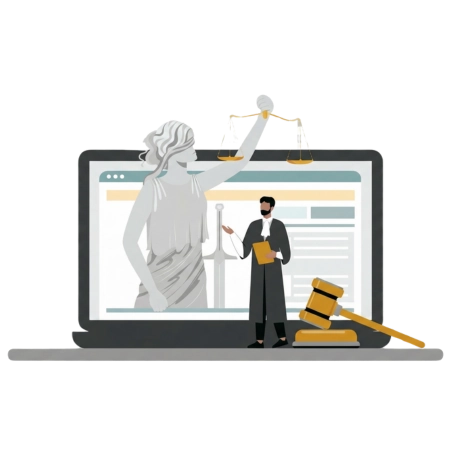
For law firms, link building is more than a marketing tactic; it’s a fundamental strategy for strengthening online presence and credibility. When authoritative websites reference your firm, search engines recognize it as a signal of trust, improving rankings and visibility. A well-executed link-building approach enhances search performance and positions your firm as a reliable resource in the legal industry.
However, ineffective or unethical link-building practices can harm rankings and even lead to penalties. Prioritizing high-quality backlinks from reputable sources is essential for long-term success. Sustainable growth requires relevance, trust, and persistence, ensuring your firm’s digital authority remains strong while fostering meaningful connections within the legal and business community.
For law firms, backlinks serve as a digital vote of confidence, signaling credibility and authority to both search engines and potential clients. A high-quality backlink comes from a reputable, authoritative, legal, or business-related website, one that Google trusts and ranks highly. When respected industry sources link to your firm, it strengthens your domain authority, improves visibility, and enhances client acquisition efforts.
Not all backlinks carry equal weight. The type of link influences a website’s SEO performance. Here are two key categories:
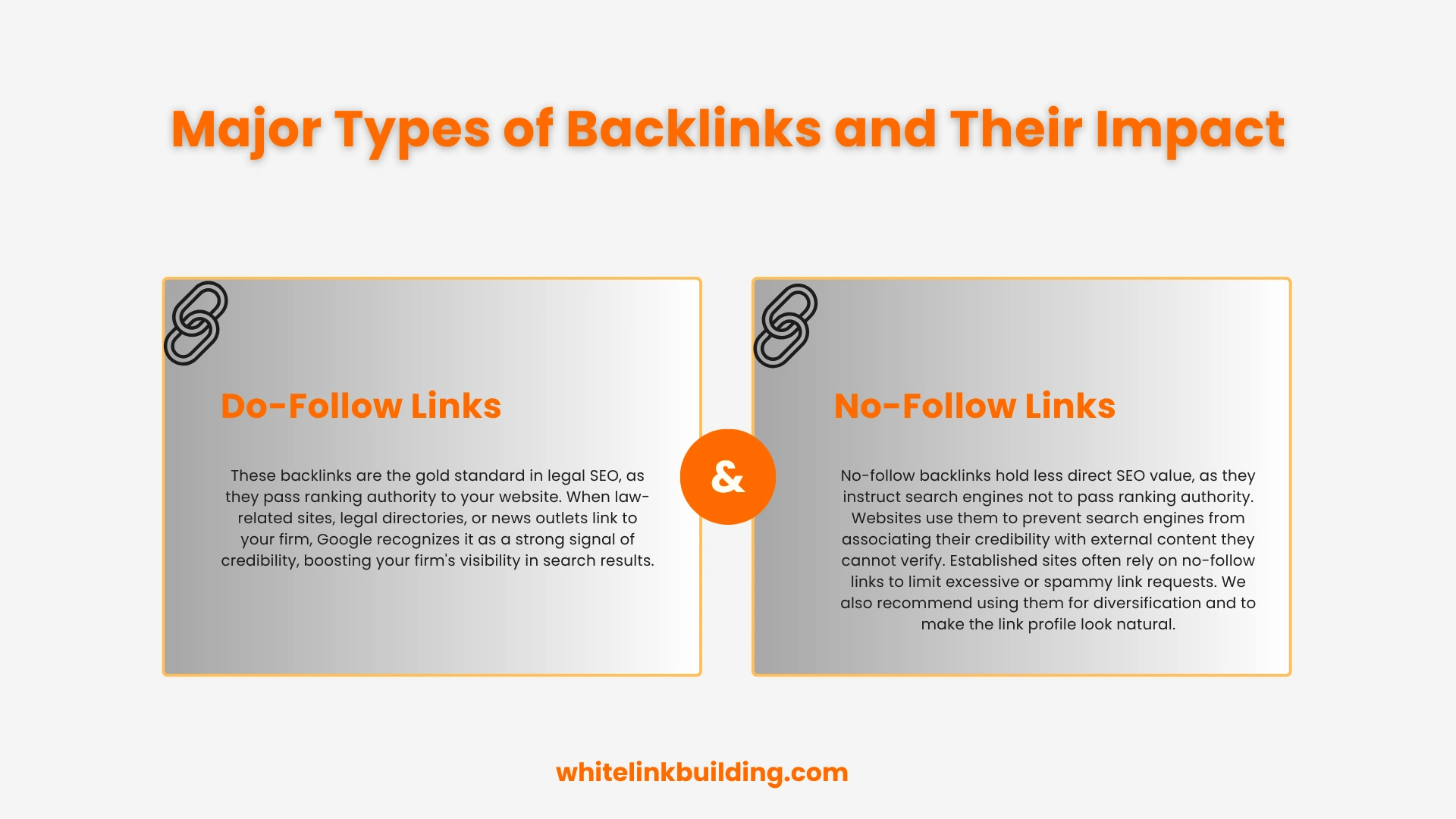
Understanding how backlinks function and prioritizing high-authority links is essential to building long-term digital strength.
In a competitive and trust-driven legal market, standing out online is more important than ever. When potential clients search for legal help, Google doesn’t just look at your content, it also considers how many reputable websites link back to your firm. These references act as signals of authority, helping your firm rank higher, gain credibility, and attract the right audience.
This is where strategic link building becomes critical, it serves as a digital endorsement, reinforcing your credibility and visibility. According to Moz, A few high-quality links from authoritative sites will always outperform hundreds of low-quality links.
However, the impact of high-quality backlinks extends far beyond search rankings. A well-structured link-building strategy can:
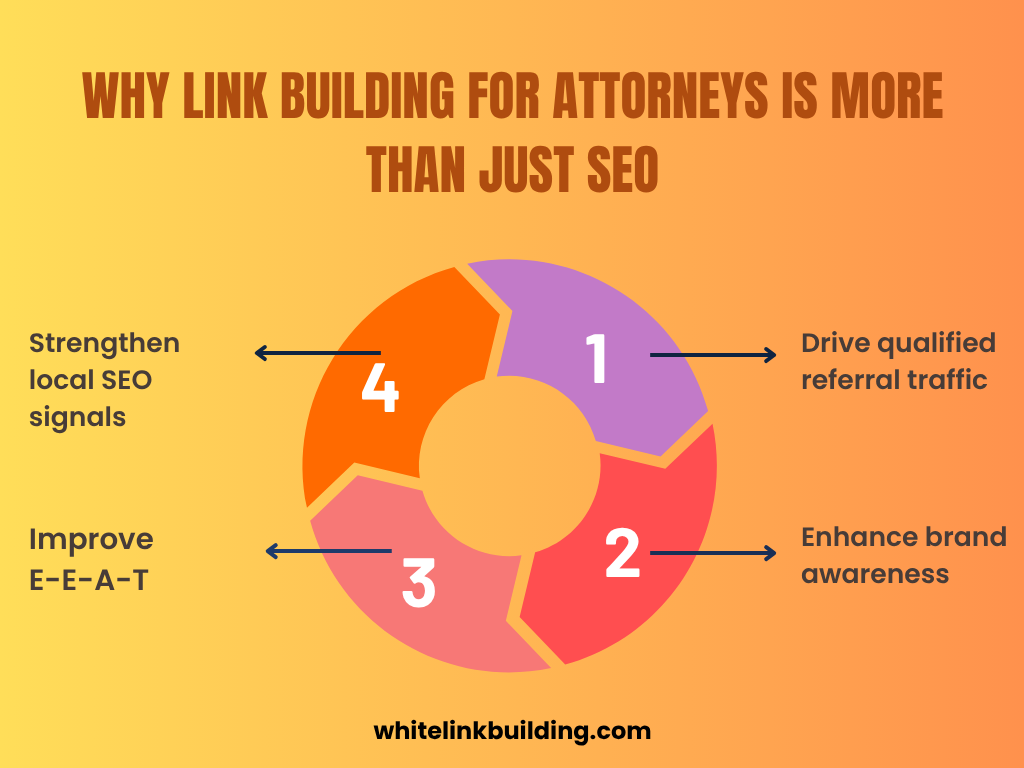
Ultimately, effective link building does more than provide an algorithmic edge; it fosters lasting digital authority, positioning your firm as a trusted leader in the legal space.
Not all backlinks are equal. The wrong links can do more harm than good. For lawyers, these are the most effective types:
Links naturally embedded within content from reputable legal blogs, news sites, and educational platforms provide strong validation for your firm’s credibility. Search engines view these as authoritative endorsements, increasing rankings while enhancing trustworthiness. Securing editorial links requires high-quality content and relationships with industry influencers who recognize your expertise.
Industry-specific platforms such as Avvo, Justia, and FindLaw provide authoritative backlinks that not only promote SEO but also enhance local visibility and credibility within the legal community.
It might help more if you try to get your site listed in the local chamber of commerce directory or other local directories, which are a go to source for people in your area. Remember, authentic link sources matter a lot.
Citations from platforms such as Yelp, Google Business Profile, and local bar associations strengthen local SEO, improving visibility for clients searching in your geographic area.
These listings validate your firm’s legitimacy and proximity-based authority, making it easier for prospects to find and trust your services. Consistent updates and accurate information maximize the impact of local citations.
Writing expert legal insights for respected blogs and regional publications enhances credibility and fosters trust. These guest contributions position your firm as an authority while securing valuable dofollow backlinks.
Thought leadership content, case studies, or legal trends analysis can attract engagement, benefiting both SEO rankings and professional reputation.
Press releases and expert commentary on significant legal cases can earn backlinks from media outlets, increasing exposure and reinforcing expertise. By contributing to news stories or legal discussions, your firm gains credibility while enhancing visibility. Quality PR placements grow organic traffic, demonstrating thought leadership to both search engines and potential clients.
Building a strong backlink profile is essential for law firms, but it comes with unique hurdles. From strict search engine policies to limited linkable assets, overcoming these challenges requires a strategic and ethical approach. Below are the most common obstacles attorneys face in link building and how to address them effectively:
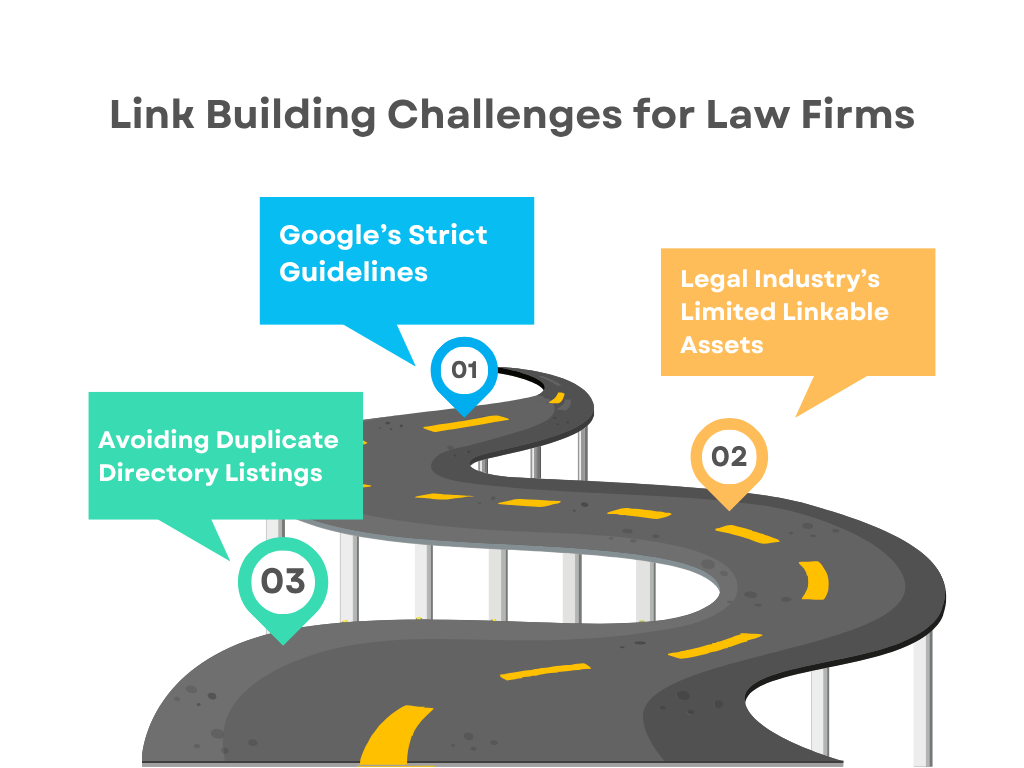
Google’s Webmaster Guidelines strictly prohibit manipulative link schemes. Many attorneys unknowingly outsource to vendors that engage in private blog networks (PBNs), spammy directories, or buy links on link farms. This can backfire.
The best approach is to get relevant links with natural anchor text at a steady pace that doesn’t attract the Google spam system.
Law firm websites often prioritize service pages, which typically struggle to earn organic backlinks. Without valuable content, such as blog posts, comprehensive guides, or industry-specific statistics, naturally attracting links becomes difficult.
A strong content strategy is essential for improving visibility and authority, as informative resources encourage external sites to reference and share your expertise, strengthening your digital presence.
Repetitively listing your law firm across the same directory or using slight name variations can negatively impact your SEO. Search engines prioritize accuracy, and inconsistencies can create confusion, reducing your credibility and ranking potential.
Maintaining uniformity across all listings, ensuring correct firm name, address, and contact details, helps strengthen your local search visibility and overall digital authority. According to Ahrefs, Successful link building isn’t about spamming, it’s about building relationships and offering value
Establishing a strong backlink profile requires a strategic approach. Law firms should focus on ethical and effective methods to ensure credibility and search visibility. Here are the safest ways to build high-quality links:
Start by publishing long-form, informative content on your site. Think “What to Do After a DUI Arrest in New Jersey” or “How Child Custody Laws Work in Austin”. These serve as linkable assets for bloggers, journalists, and legal directories.
Contribute to local newspapers, sponsor city events, or join local business groups. These often provide high-authority backlinks and a better chance to rank in your geographic area.
Sign up and respond to journalists’ queries related to law. When quoted, you get backlinks from media outlets like Forbes, USA Today, or niche legal sites.
Make sure your profiles on Avvo, Justia, Super Lawyers, Martindale-Hubbell, and the state bar are accurate and complete. Most offer a free backlink to your site.
Identify relevant, authoritative legal blogs or regional publications. Offer to contribute legal insights in exchange for an author bio backlink. This must be well-written, ethical, and non-promotional to avoid Google penalties.
While link building is essential for a law firm’s SEO strategy, certain practices can harm rankings and credibility. Avoid these common pitfalls to ensure a strong and ethical backlink profile:
Even if they promise hundreds of backlinks fast, these services often use PBNs or link farms. Google is very good at identifying unnatural patterns.
Using exact-match keywords like “Houston personal injury lawyer” in every link is a red flag. Diversify your anchor text with brand names, URLs, and natural phrases.
A link from a plumbing blog to your criminal defense site won’t help you. It can send confusing signals to search engines.
While some legal forums offer relevant discussion opportunities, mass posting backlinks in comments or irrelevant threads is outdated and penalized.
A single link from a high-authority legal site will likely outweigh dozens from random blogs. Google uses semantic relevance to understand how contextually appropriate a backlink is. This is why being linked to from a state bar association carries more weight than a non-related general blog with a higher domain rating.
While link building can be complex, it is entirely achievable with the right strategy. If you or your firm struggles to secure quality backlinks, WhiteLinkBuilding.com is here to provide expert guidance customized specifically for attorneys.
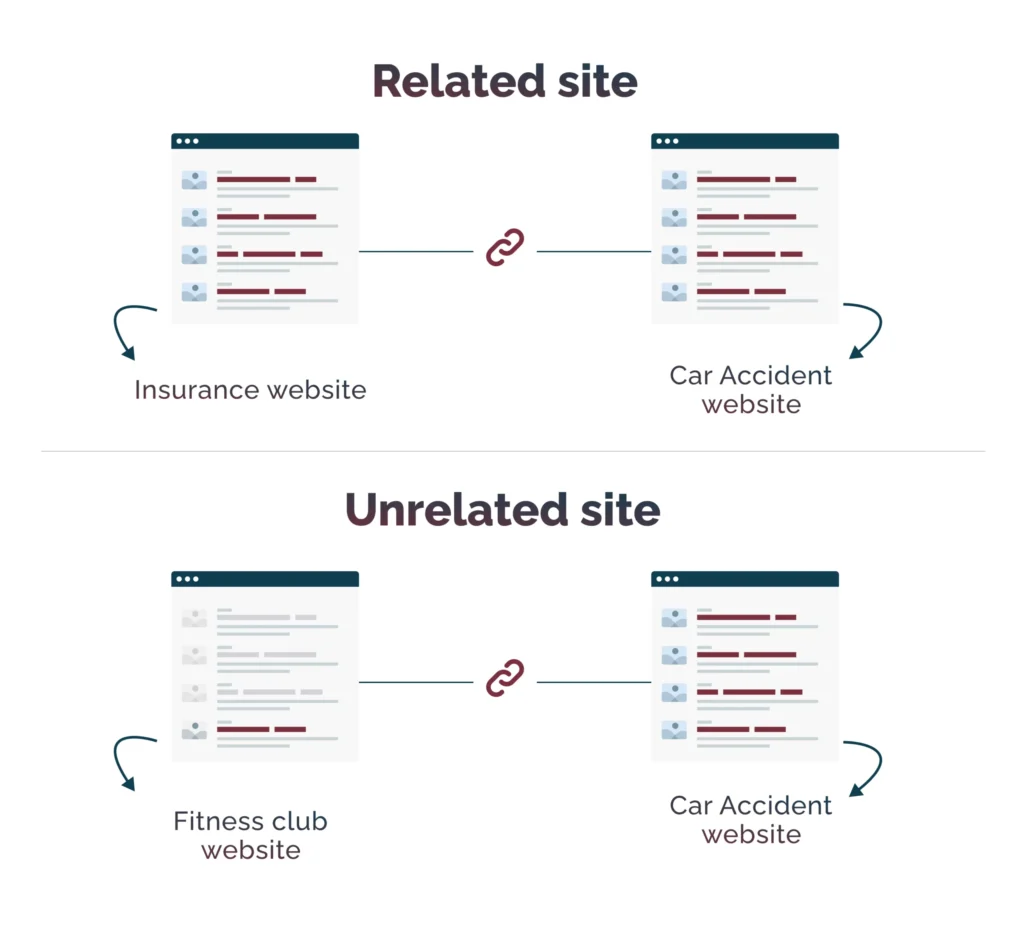
We specialize in helping law firms build an authoritative online presence, improve search rankings, and connect with the right audience. Let us handle the technical challenges while you focus on delivering exceptional legal services with confidence.
How to Use Digital PR for Law Firm Backlinks
Digital PR is underutilized in legal marketing. Examples include:
Without high-quality content, your link-building efforts will struggle to gain momentum. To attract authoritative backlinks, consider developing:
SEO results don’t appear overnight. Significant ranking improvements typically take 3–6 months, as Google crawls, indexes, and reassesses domain authority based on new backlinks.
Consistency matters more than sheer volume. Instead of relying on link spikes, which can harm rankings, prioritize sustainable growth. Focus on acquiring 5–10 high-quality links per month rather than flooding your profile with 100 low-value links in a week. A steady, strategic approach ensures long-term digital authority.
Link building is a strategic necessity for law firms seeking long-term digital authority. When executed effectively, it strengthens credibility, improves search visibility, and attracts ideal clients. From editorial content to authoritative directories, digital PR, and avoiding toxic links, the focus should always be on quality rather than quantity.
Sustainable link-building is not about quick fixes, it requires relevance, trust, and persistence. Prioritizing ethical and effective strategies ensures lasting success, setting your firm apart in search rankings while reinforcing its reputation as a trusted legal authority.
Link building is a broad and critical aspect of legal SEO, helping law firms improve visibility, authority, and client acquisition. A well-planned strategy ensures long-term growth and credibility in a competitive industry.
If you have questions or need expert guidance on effective link-building strategies, WhiteLinkBuilding.com is here to assist. Contact us today, and let’s build a powerful, sustainable online presence for your firm.
Law firms benefit most from editorial backlinks, legal directory listings, and local SEO citations. In 2025, strategies like digital PR, guest posting on authoritative legal blogs, and publishing expert insights continue to be the most effective link-building methods for attorneys aiming to improve their online visibility and domain authority.
Backlinks act as signals of trust to Google, helping law firm websites rank higher in search results. High-authority backlinks from legal publications, directories, and news outlets boost your site’s E-E-A-T score, improve local search performance, and attract more qualified legal clients online.
Lawyers can earn high-authority backlinks by publishing legal guides, contributing guest posts to respected law blogs, and being featured in trusted directories like Avvo or Justia. Participating in local events, offering expert commentary, and using platforms like HARO also help generate ethical, high-quality backlinks that support long-term SEO success.